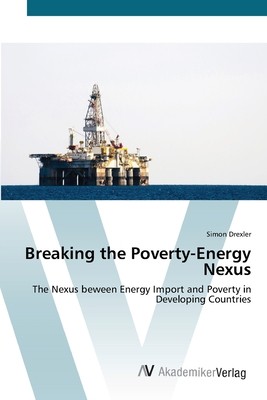
- We will send in 10–14 business days.
- Author: Simon Drexler
- Publisher: AV Akademikerverlag
- Year: 2012
- Pages: 160
- ISBN-10: 363941523X
- ISBN-13: 9783639415230
- Format: 15.2 x 22.9 x 0.9 cm, minkšti viršeliai
- Language: English
- SAVE -10% with code: EXTRA
Reviews
Description
Revision with unchanged content. In our modern world, more than 2 billion people still have no access to mo-dern energy services. Without considerably improving the energy situation in developing countries the central Millennium Development Goal of halving global poverty by 2015 will not be achieved because energy is vitally linked to numerous important dimensions of development. When it comes to the adverse -impacts of unsustainable energy use in developing countries, the cur-rent energy-poverty debate is mainly restricted to the rural or household level of analysis. On the whole, little detailed investigations are made about the structural economic costs associated with energy consumption patterns on the macro or national level. This is especially the case for the great majo-rity of developing countries that do not possess significant commercial energy resources and therefore heavily rely on fossil fuel imports to meet their energy needs. This book is intended to contribute to the debate by offering a thorough and comprehensive structural analysis of how energy import de-pendency and poverty are linked at the macro level and how renewable energy sources can help to reduce the incidence of poverty in developing countries by mitigating import dependency. It is a reference for anyone involved in teaching, research and thin-king about the energy-poverty nexus in international development politics.
EXTRA 10 % discount with code: EXTRA
The promotion ends in 21d.02:48:33
The discount code is valid when purchasing from 10 €. Discounts do not stack.
- Author: Simon Drexler
- Publisher: AV Akademikerverlag
- Year: 2012
- Pages: 160
- ISBN-10: 363941523X
- ISBN-13: 9783639415230
- Format: 15.2 x 22.9 x 0.9 cm, minkšti viršeliai
- Language: English English
Revision with unchanged content. In our modern world, more than 2 billion people still have no access to mo-dern energy services. Without considerably improving the energy situation in developing countries the central Millennium Development Goal of halving global poverty by 2015 will not be achieved because energy is vitally linked to numerous important dimensions of development. When it comes to the adverse -impacts of unsustainable energy use in developing countries, the cur-rent energy-poverty debate is mainly restricted to the rural or household level of analysis. On the whole, little detailed investigations are made about the structural economic costs associated with energy consumption patterns on the macro or national level. This is especially the case for the great majo-rity of developing countries that do not possess significant commercial energy resources and therefore heavily rely on fossil fuel imports to meet their energy needs. This book is intended to contribute to the debate by offering a thorough and comprehensive structural analysis of how energy import de-pendency and poverty are linked at the macro level and how renewable energy sources can help to reduce the incidence of poverty in developing countries by mitigating import dependency. It is a reference for anyone involved in teaching, research and thin-king about the energy-poverty nexus in international development politics.


Reviews